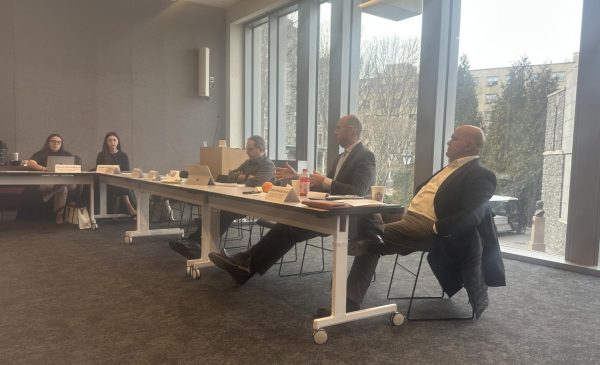Fordham Co-Hosts Virtual Panel Focused on Sustainability in Fashion
Fordham co-hosts panel to examine the intersection of fashion and social justice and sustainability. (Courtesy of Fabrik)
On Feb. 24, Fordham students participated in a fashion show called “Sustainable Fashion for All: Examining the Industry Through the Lens of Social Justice.” The virtual event was co-hosted by the Unitarian Universalist Association, Fashion Revolution, Fordham University and the United Nations Association of New York.
The event was moderated by Jeff Trexler, a professor at Fordham Law School. Experts from all over the fashion industry spoke on ethical issues that plague the modern fashion industry. Speakers focused on issues of sustainability, labor, consumerism and supply chains as they relate to moral and ethical dilemmas in both fast and high fashion markets.
The event’s first speaker, Ayesha Barenblat, is the founder of a civil society organization called Remake that focuses on using fashion force to solve issues of human rights and labor. Barenblat pointed to labor commodification that strips low-paid fashion workers of their rights and dignity. The COVID-19 pandemic had a negative impact on the fashion industry, but its workers were harmed even more, Barenblat explained. The pandemic caused the cancellation of shipments worth a total of $40 billion. The fashion industry is largely built on debt, so the shipment cancellation led to mass layoffs for fashion workers, many of whom are Black and brown women, according to Barenblat.
Barenblat said the pandemic “cracked open the power structure” and showed “how supply chains are set up to exploit natural resources and workers to benefit rich shareholders.”
Tara Rangarajan, the head of communications, brand management and country programs at the International Labor Office in Geneva, spoke about ways that fashion consumers can do their part in supporting laborers that make the clothes everyone wears.
Laborers being able to have a strong voice in their factories and make their own choices has shown to improve working conditions, said Rangarajan. She explained that the pandemic helped expose the inequalities between workers and employers, as well as countries involved in the transaction of outsourcing labor. “There is a momentum to use this major disruption to the industry as a way to challenge the status quo and build back a better, more resilient, inclusive, sustainable and equal garment industry,” said Rangarajan.
Cyril Naicker, a South African fashion consultant and influencer, spoke more about the projected future of the fashion industry. Naicker cited the unsustainable, fast-paced nature of the fashion industry as the primary cause of poor working conditions.
“We can’t go back to business as usual, we must do better,” said Naicker. “The fashion industry as unbalanced systemic racism is a conversation that needs to happen.”
Naicker believes the industry needs to be revolutionized, made so that it instead focuses on valuing people, the environment, creativity and profits in equal measure instead of sacrificing the first three values for the latter. In its current state, Naicker referred to fast fashion as “modern-day slavery,” as the infrastructure in countries that host outsourced labor do not and cannot support the workers who are exploited and paid virtually nothing for working in unsafe conditions.
Naicker also explained the process by which the modern fast fashion industry has taken stage. Trade barriers between countries were softened, meaning that brands had gained financial incentives to move production overseas. Cheaper labor overseas then resulted in cheaper clothes, and consumers began spending more on fashion than before, said Naicker.
This is the system that sustainable fashion movements hope to change. Naicker said a fashion revolution should “amplify unheard voices — those of the supply chain producers, workers and communities affected by the fashion industry — giving them more visibility and providing a platform for their stories.”
June Park, an assistant professor of fashion merchandising at Oklahoma State University, spoke about sustainable fashion from a consumer’s perspective. Fast fashion consumers are not necessarily unconscious of the industry’s social justice and environmental issues but are misled by fashion marketing, she said.
Words like “recyclable,” “sustainable,” “transparent” and “conscious” are seen over and over again in fashion marketing, but these labels are often misleading, explained Park. “Less than 1% of clothing can actually be recycled to make other clothes,” she said. “That means that a majority of clothes, like more than 99% of clothes, are recycled into inferior quality products like rags.”
The sustainable fashion presentation hoped to raise awareness of the social justice and environmental issues that plague the fashion industry in all sectors, as well as promote consciousness within consumers of the fashion industry to create a sense of caring for community and nature, said Trexler.

Sebastian Diaz is a senior from Chapel Hill, N. C. who is double majoring in journalism and film. After starting as a news reporter for The Fordham Ram...













































































































































































































